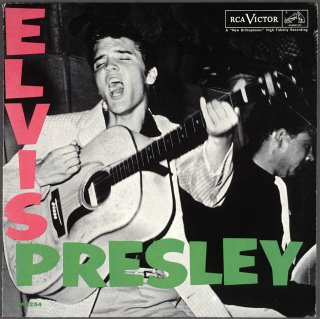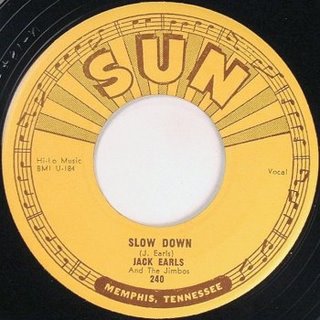
Carl Perkins, Boppin' The Blues.
Carl Perkins, Everybody's Trying to Be My Baby.
Jack Earls, Slow Down.
Ray Harris, Come On Little Mama.
Roy Moss, You're My Big Baby Now.
Eddie Bond, Flip Flop Mama.
The Cochran Brothers, Tired and Sleepy.
Don Woody, Let's Make Like A Rock and Roll.
Elvis Presley appeared on national television eleven times during 1956--first on the Dorsey Brothers show and then, ascending through the hierarchy of variety shows, on Milton Berle, Steve Allen and finally Ed Sullivan, who pronounced Presley safe for public consumption. So you can imagine each consecutive appearance, along with each new RCA single, being another verse of the gospel, spreading far and wide.
Throughout the year, they seemed to emerge in response--rangy, ambitious, sometimes nasty guys, mainly country boys like Presley had been (and still was, really). Five years earlier, three years earlier, they would have tried to sound like Webb Pierce, but now there was something new in the air. The success of Presley, and Carl Perkins, whose "Blue Suede Shoes" had dominated the country, R&B and pop charts in early '56, and Johnny Cash, who by mid-'56 had recorded the essential "Folsom Prison Blues" and "I Walk the Line," created a whole different set of options.
Perkins, in particular, was Sam Phillips' choice to replace Presley as Sun Records' standard bearer. Born dirt-poor (he was picking cotton for a living as late as his early 20s), Perkins first recorded some fairly traditional country tracks, which went nowhere. When Elvis left Sun, however, Phillips told Perkins to make some rock and roll--the result, in December 1955, was one of the music's national anthems--"Blue Suede Shoes." But Perkins didn't have the looks, or the luck, of Presley (a near-fatal car accident prevented Perkins from performing "Blue Suede Shoes" on Perry Como's TV show, thus cementing the song as an Elvis track in the general public's view.)
But he had the sound. "Boppin' the Blues" is one of the tracks I would offer if someone asked me to define what rock and roll is. It's one of the best things ever made--I can't be objective here, folks. Just enjoy it, and play it loud. Released as Sun 243 in March 1956.
And "Everybody's Trying to Be My Baby" is nearly as great--released only as an album track on a Sun LP "Teen Beat" in March '56, it became one of the standard George Harrison numbers during the Beatles' early years (and is the final track on Beatles for Sale.)
Find both on Original Sun Greatest Hits.

While recording Cash and Perkins, Sam Phillips also found some other aspirants. Sun 240, released in May '56, featured the scorching "Slow Down" by Jack Earls.
Born in 1932 in Woodbury, Tennessee, Earls had moved to Memphis by the late 1940s and played with a few local bands. He auditioned for Phillips in 1955--Phillips loved his intense vocals but didn't care much for the group Earls had put together (some five or six guitarists!). So Earls started fresh--he nabbed Bill Black's brother Johnny, Danny Walquist (b) and Warren Gregory (d), and in late '55 recorded a track Phillips loved--"Hey! Jim". Phillips planned to release it as the A-side of Earls' first single, and even suggested renaming the group "The Jimbos" as a further way to sell the song.
But then Earls dashed out "Slow Down" one night in early '56, and when Phillips heard it, he scrapped plans to put out "Hey! Jim" and went with the former track instead. It was a solid, if regional hit, but Earls had no more Sun releases. Mainly it was because Earls didn't want stardom that badly--he had a steady job at the Colonial Bakery, and didn't care to spend every waking hour singing and plugging his singles.
And Sun 254, released in September, featured the vicious, frantic masterwork that is Ray Harris' "Come On Little Mama." Harris, born in Tupelo, Miss., in 1927, was working at Firestone Tire in Memphis in the early '50s when he met Bill Black, and through Black, the regular crew at Sun Records--Elvis, Scotty Moore, and Phillips. Harris was in the recording booth the night Presley cut "Good Rocking Tonight," which converted him to rock & roll, and soon afterward Harris wrote "Come On Little Mama". Phillips recorded it, Sun released it, and Harris was off.
Find both on Red Hot Rockabilly Classics.

The mysterious Roy Moss released three singles (two in '56 and another in 1958) and then vaulted right into oblivion. Does anyone know anything about him? Rev. Frost? All we know is that "You're My Big Baby Now," his first, shuddering single, was released in January '56 as Mercury 70770.
Eddie Bond is best known as the guy who allegedly told Elvis, back before Presley recorded his first Sun single, that Elvis should go back to driving a truck.
Still, Bond didn't seem to obsess too much over his wrong bet (and he and Elvis apparently were friends afterward)--Bond released a number of great tracks in the '50s, and still occasionally plays today. "Flip Flop Momma" was the b-side of "Slip, Slip, Slippin' In," released as Mercury 70882 in June '56.
You can find both on That'll Flat Git It! Vol. 11.
Eddie Cochran and Hank Cochran were not brothers, but billed themselves as such. Eddie was born in Minnesota in 1938 and his family moved to California in the early 1950s. His early career was quite similar to Buddy Holly's--his partner Hank, a more traditional country player, mainly sang lead while Eddie concentrated on guitar, and their songs were generally standard country numbers.
However, just like Buddy Holly, Eddie saw Elvis perform, and walked away radicalized. No longer content to do country songs, and also chafing to get more lead vocals, Eddie pushed for the duo to record some more uptempo songs. In February '56, they recorded "Tired and Sleepy," which is anything but. Soon afterward, the Brothers broke up, Eddie wound up performing "Twenty Flight Rock" on The Girl Can't Help It, and the rest is legend.
Released in June 1956 as Ekko 3001. Find on Somethin' Else.
And wind out with Don Woody. A DJ who wound up singing with a western swing band and who wrote Brenda Lee's first single, Woody recorded four tracks for Decca in Nashville, all of which were fantastic--"Bird Dog" and "Barking Up the Wrong Tree" were released as Decca 30277 and, while the single sold well enough, Decca declined to extend his contract. More bizarrely, the label chose not to release the other two songs from the session--the awesome "Morse Code" and the mighty "Make Like A Rock and Roll."
Woody, after another frustrating experience with Arco in 1958, called it quits and left music entirely, his testament being a few sticks of dynamite that still sound amazing today. Find on "Rock and Roll" on That'll Flat Git It Vol. 2.
No comments:
Post a Comment